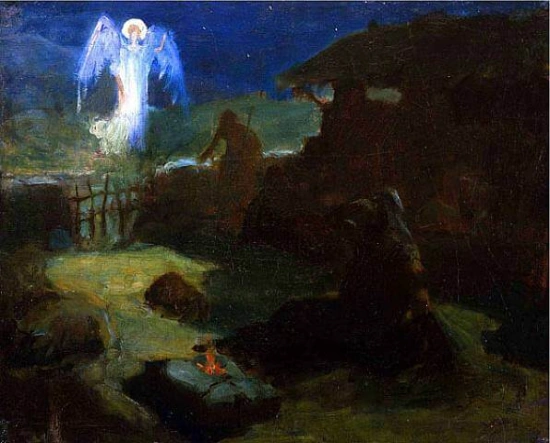455. [And in their tails,] for their tails were like serpents, having heads, and with them they do harm. This symbolizes the reason, namely, that they are sensual and turned upside down, speaking truths with their mouths, but falsifying them by the premise which forms the chief tenet of their religion, and thus deceiving others.
The symbolism here is similar to that earlier in the case of the locusts (nos. 438, 439), but there we were told that they had tails like scorpions, and here tails like serpents. For the people described by locusts there speak and persuade using the Word, scholarship and learning, whereas the people described here employ arguments that consist only of appearances of truth and fallacies; and people who use these to speak harmoniously and seemingly wisely do indeed deceive others, but not to the same extent.
[2] Serpents in the Word symbolize sensual elements, which are the lowest constituents of a person's life, as described in no. 424 above. The reason is that all animals symbolize human affections. Consequently, in the spiritual world the affections of angels and spirits also look at a distance like animals, and merely sensual affections like serpents. That is because serpents slither along the ground and lick the dust, and sensual matters are the lowest in the intellect and in the will, being most closely connected with the world and being fed by its objects and delights, which affect only the physical senses of the body.
Harmful serpents, of which there are many kinds, symbolize sensual matters dependent on the evil affections that form the interior motivations of the mind in people who, owing to the falsities accompanying evil, are irrational. And harmless serpents symbolize sensual matters dependent on the good affections that form the interior motivations of the mind in people who, owing to the truths accompanying goodness, are wise.
[3] Sensual matters dependent on evil affections are symbolized by serpents in the following passages:
They shall lick the dust like a serpent. (Micah 7:17)
Dust shall be the serpent's food. (Isaiah 65:25)
(The serpent was told:) On your belly you shall go, and you shall eat dust all the days of your life. (Genesis 3:14)
The sensual level in a person is thus described, and because it communicates with hell, where the people are all sensual, it turns heavenly wisdom in spiritual matters into hellish insanity.
Do not rejoice, Philistia...; for out of the serpent's roots will come forth a viper, whose offspring will be a fiery flying serpent. (Isaiah 14:29)
They hatch a viper's eggs...; he who eats of its eggs dies, and when anyone squeezes them, a viper breaks out. (Isaiah 59:5)
Because the children of Israel wished to return to Egypt, they were bitten by serpents (Numbers 21:4-9). To return to Egypt means, symbolically, to go from being spiritual to being sensual. So we read,
(The) mercenaries (of Egypt)...are turned back... Its sound shall go like that of a serpent... (Jeremiah 46:21-22)
[4] Because Dan was the furthest out of the tribes and so symbolized the outmost component of the church, which is the sensual one subject to its interior ones, therefore this is said of it:
Dan shall be a serpent by the way... that will bite the horse's heels so that its rider falls backward. (Genesis 49:17)
A horse's heels symbolize the lowest constituents of the intellect, which are its sensual ones. To bite means, symbolically, to cling to them. The rider symbolizes the ignorance produced by them, by which it perverts truths. We are told, therefore, that the rider will fall backward.
Since sensual people are cunning and crafty like foxes, therefore the Lord says, "Be as wise as serpents" (Matthew 10:16). For a sensual person speaks and reasons on the basis of appearances and fallacies, and if he possesses a talent for arguing, he knows how to skillfully defend every falsity, including as well the heresy of faith alone; and yet he is so dim-sighted at seeing truth that almost no one could be more so.







